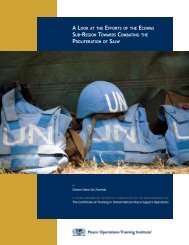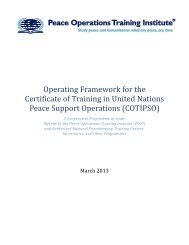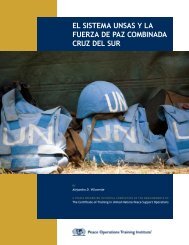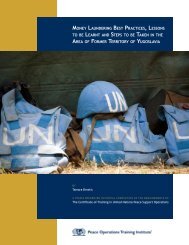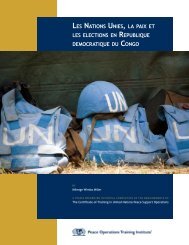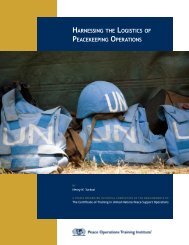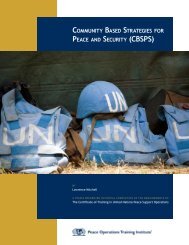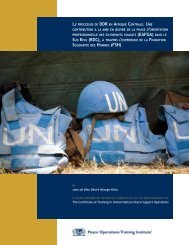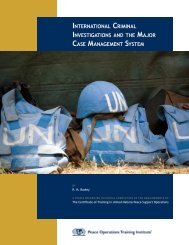the rise and rise of private military companies - Peace Operations ...
the rise and rise of private military companies - Peace Operations ...
the rise and rise of private military companies - Peace Operations ...
You also want an ePaper? Increase the reach of your titles
YUMPU automatically turns print PDFs into web optimized ePapers that Google loves.
Hyder GulamPMCs have been involved in escorts for <strong>the</strong> transfer <strong>of</strong> emergency relief to waraffectedcommunities. Armed escorts are used extensively in large logisticaloperations, such as those run by CARE <strong>and</strong> World Food Programme. The escorts areusually provided by <strong>the</strong> host government. 120 The reason behind this is that violenceagainst humanitarian staff has increased dramatically in recent years. Insecurity inplaces such as Chechnya, Somalia <strong>and</strong> Colombia has highlighted <strong>the</strong> security risks toaid workers. In addition, PMCs have also been used for logistical support to UN<strong>Peace</strong>keeping Missions. This last point was recognised by <strong>the</strong> Brahimi Report <strong>of</strong> <strong>the</strong>Expert Panel on UN <strong>Peace</strong> Support <strong>Operations</strong>. This report noted that PMCs werelikely to provide technical support in international peacekeeping efforts, but it wasunlikely that <strong>the</strong>y would be used to perform <strong>military</strong> tasks by <strong>the</strong> UN in anysignificant capacity. 121On a national level, little is understood about <strong>the</strong> links between local PMCs <strong>and</strong> state<strong>military</strong> forces, government <strong>of</strong>ficials or even criminal elements <strong>of</strong> societies. Any <strong>of</strong><strong>the</strong>se associations may tarnish <strong>the</strong> image <strong>of</strong> aid agencies <strong>and</strong>, present seriousquestions about <strong>the</strong>ir operations. On a global level, PMCs are part <strong>of</strong> a wider process<strong>of</strong> aid becoming more politicised <strong>and</strong> milita<strong>rise</strong>d, which reduces <strong>the</strong> legitimacy <strong>of</strong> <strong>the</strong>goals that is trying to be obtained. PMCs thrive where <strong>the</strong> state may be weak, in terms<strong>of</strong> governance. It is also noteworthy that PMCs are most active in countries afflictedby ‘resource wars’ in which <strong>the</strong> state is competing with an opposing force over naturalresources. 122The use <strong>of</strong> PMCs is also symbolic <strong>of</strong> aid agencies being among those fortunateenough to be able to buy security. This can be to <strong>the</strong> detriment <strong>of</strong> <strong>the</strong> interests <strong>of</strong> <strong>the</strong>majority <strong>of</strong> society for whom security is a luxury. 123 The fundamental feature <strong>of</strong>humanitarian operations is precisely <strong>the</strong>ir humanitarian character, <strong>and</strong> this can only beundermined, if it is delivered at gun-point. 124 The use <strong>of</strong> such <strong>companies</strong> byhumanitarian agencies, whilst not widespread, is a trend that is increasing with littleunderst<strong>and</strong>ing <strong>of</strong> <strong>the</strong> implications <strong>and</strong> limited development <strong>of</strong> appropriate policy. 125If PMC personnel are armed or are from a <strong>military</strong> background <strong>the</strong>n aid agenciesmight be perceived as being part <strong>of</strong> <strong>the</strong> conflict ra<strong>the</strong>r than good humanitariansinvolved to assist its victims. This challenges <strong>the</strong> notion <strong>of</strong> impartiality <strong>and</strong> neutrality<strong>of</strong> humanitarian action. 126120 ibid, p.15.121 The Politicisation <strong>of</strong> Humanitarian Action <strong>and</strong> Staff Security: The Use <strong>of</strong> Private SecurityCompanies by Humanitarian Agencies - International Workshop Summary Report Tufts University,Boston, Massachusetts, USA - 23/24 April 2001 at http:// famine.tufts.edu/, p.4.122 ibid, p.16.123 ibid, p.18.124 Robert M<strong>and</strong>el, Armies without States: The Privatization <strong>of</strong> Security, Lynne Reinner Publishers2002 p.19.125 Op cit, fn.13126 ibidPage 29The <strong>rise</strong> <strong>and</strong> <strong>rise</strong> <strong>of</strong> Private Military Companies




